Imagine that you are a detective investigating a murder case. You collect a blood sample and send it off for analysis. While you’re temporarily locked out of the murder case, you move to the terrorism case and begin investigating a discarded toupée. While you’re doing that, you’re alerted that the IE result in the murder case is now available.
How would that interruption (and several others like it, multiplied throughout a tangled set of tasks and cases) affect your performance? We predicted that it should impact global and local performance differently. Global performance concerns your ability to make headway through the set of cases in the allotted time, which would be reflected in the number of times you successfully request IE results, number of total clues you are able to collect, number of fruitless actions you take, and your score on a post-simulation comprehension test. (Some of the clues had to be understood in light of others in order to solve the cases. Successfully evaluating and integrating the clues requires working memory, and relevant interruptions should lower demands on working memory.) Thus, we predicted that relevant interruptions would improve global performance on all of these measures.
GLOBAL MEASURES OF PERFORMANCEInterruption improved people’s ability to collect Information Event results. Being alerted as to the status change of a previously prioritized case allowed people to effectively re-prioritize it and to check for new information at an appropriate time. In addition, if the information periodically cycled out of availability (similar, for example, to the consulting specialist who is available to speak to you between her own busy appointments), people were less effective at retrieving IEs. This did not interact with interruption status.
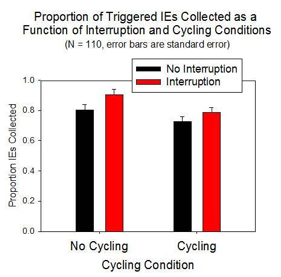
The participants who benefitted most from interruptions were those scoring low on a standard measure of working memory. That is, if one is less able to hold and monitor multiple goals in memory, then one enjoys greater gains when the monitoring of these goals is externalized.
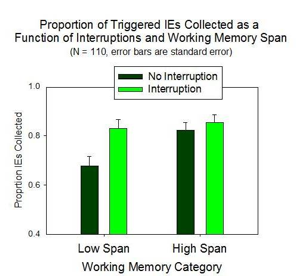
Interrupted players were better able to integrate information from the various clues, notice contradictions, and make additional inferences to solve the cases. We see this in their better performance on the post-game comprehension test.
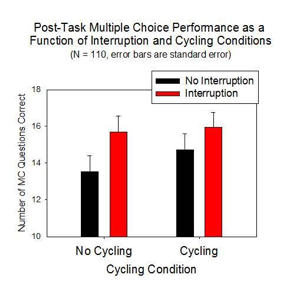
Interrupted participants were much less likely to engage in fruitless actions than uninterrupted participants. That is, rather than derail them, the interruptions guided participants to take actions at appropriate rather than inappropriate times. Impressively, it made little difference to overall performance to have IEs cycle in and out of availability.
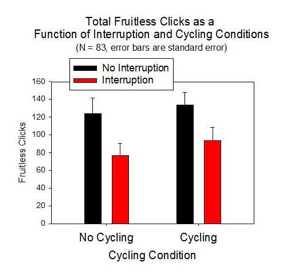
Local, harmful, effects of interruption are consistent with those found in previous research by others. When you are doing task B and someone interrupts you to say that previously-suspended task A now has an important status change, the interruption is relevant to A but irrelevant to B. Despite all of the benefits we’ve found for A and for global performance, the interruption leads to confusions and lost efficiency upon return to task B. Here we see that players had to increase their reliance on a virtual assistant to reorient them upon return to the case.
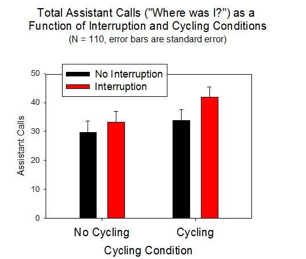
The simulation is available to download and play, or to adapt for research purposes, here.